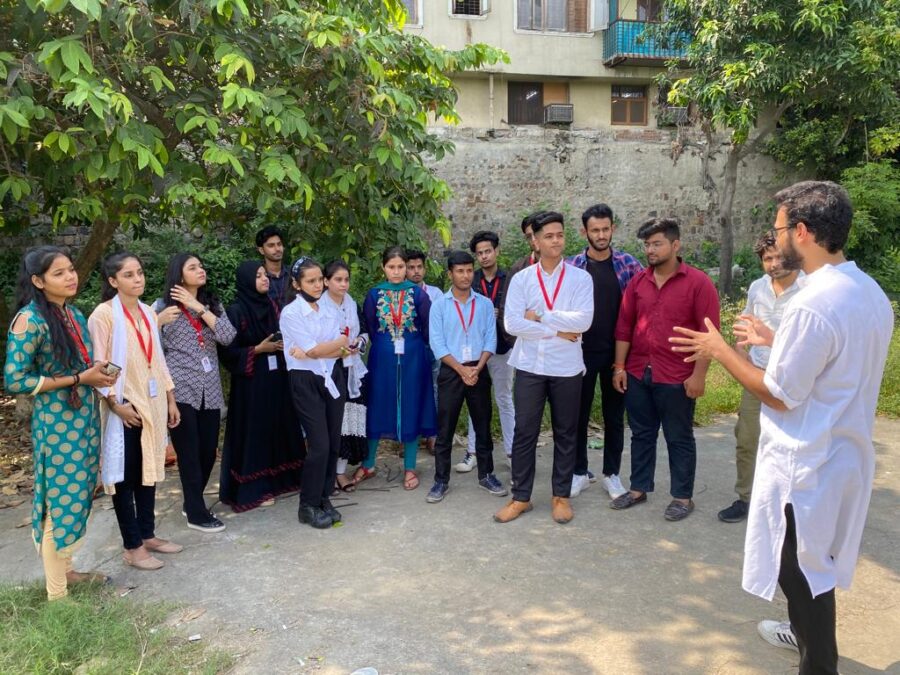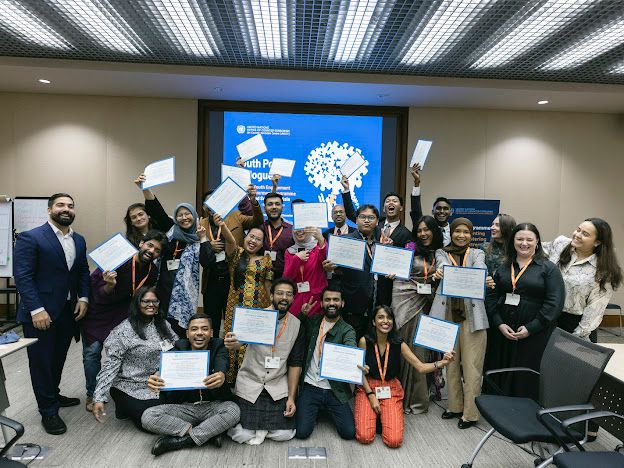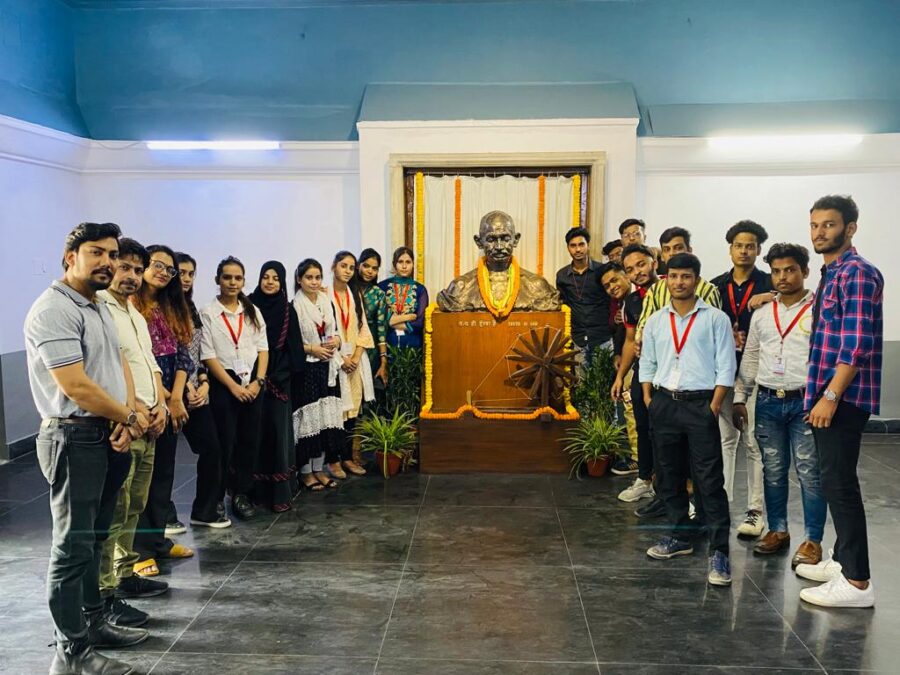Religions for Peace Youth Media Team Interviews Mr. Shameer Rishad about the Manresa 2022 Forum
One on One: Religious Youth Leaders Inspiring Local Change, for Global Impact
As part of promoting experiential learning exchange from among its diverse global networks, especially from among some of the Religions for Peace’s vibrant global youth leaders community, the below interview was conducted by Mr. Philbert Aganyo in a bid to highlight the climate crisis and community resilience from the lenses of select youth leaders, and to learn from what these young people are doing to solve environmental issues and promote just and sustainable cities.
Shameer Rishad, is from India and works for Religions for Peace, Asia and the Pacific Interfaith Youth Network under the Asian Conference for Religions for Peace. He is also the youth chairperson for Religions for Peace-India and work on issues of human rights, specifically in the area of diversity and inclusion. For Religions for Peace, he mainly work with young people to develop youth centric programmes, engaging them, on peacebuilding, preventing and countering violent extremism, leadership development, advocacy campaigning, policy consultation and much more!

PHILBERT: Can you tell us about your interfaith Climate work?
SHAMEER: The first campaign I managed for Religions for Peace was about the climate crisis; Beginning with a brief background, Dr. Renz Argao who serves as the Moderator of Religions for Peace Asia and the Pacific Interfaith Youth Network, and who also happens to be my mentor inspired my involvement.
At that time, the International Youth Committee which he was serving in as Co-Chair, supported by the Religions for Peace International, launched the campaign titled “Our Earth, Our Responsibility”. I was really moved by seeing his commitment to countering the climate crisis and how he mobilised young people from different religious communities to take action in the Philippines. I did the same in India by conducting youth workshops, creating awareness about climate change, taking action by taking pledges and planting trees in selected areas that were experiencing adverse effects of the climate change, to preserve and replenish the bare soil.
PHILBERT: Do you believe in a Multi-Religious solution to the current Climate Crisis?
SHAMEER: I believe that most systemic problems need a multi-religious approach because a lot of times, sadly, we see extremist groups, various political organisations, and society disruptors use religion as a tool to divide people.
So yes, I believe that whenever there is a systemic crisis, like the climate crisis, people of faith are imperative because all religions talk about respecting nature and saving the planet. Also, as a person of faith, I believe in sustainable living and adopting lifestyles that preach sustainability thus leading by example so that future generations also prioritize sustainability. This is the unique place of faith actors regardless of anyone’s belief.
I think that the climate crisis acts as a connector for multi-religious action and it can be a powerful driver as well to make young people realise that despite belonging to a different religion or having a different faith inclination or belief system from others, we have a crisis at hand that affects us all in spite of our differences, and which we need to actively counter. Not one religious community alone can counter the effects of climate change. We all need each other and to work together as humanity to mitigate this crisis.
PHILBERT: I am aware you are attending the Climate Conference in Manresa, Catalonia in Spain, could you kindly share with me some of the lessons and experiences that you are bringing with you to Spain?
SHAMEER: I’m coming to Manresa, Spain with the hope of sharing my experience of working with young people from across Asia, and also the desire to learn from the young people in Spain, so that together we can take collective action towards countering the climate crisis.
I am persuaded that each person has an individual experience, and that each community is experiencing the effects of climate change in a different way. Therefore it is important to share these experiences and work together, for a collective voice is stronger than an individual one. I believe that together we will be able to rise up and advocate for a better world.
PHILBERT: Thank you for sharing your personal persuasions about Manresa; So what are your expectations of the Manresa Conference?
SHAMEER: I expect to interact and learn from young people from all over the globe who are passionate about climate change. I want to understand from them what programmes they are implementing to counter the climate crisis, and also take advice from them on how as a youth leader from Asia, I can develop more programmes for my region and work holistically to counter the climate crisis. In a nutshell, My greatest expectation about the Manresa Conference is to experience and be part of the diversity of ideas and approaches for solving complex problems – like the Global Climate agenda.
PHILBERT: You are a youth leader. When people think of leadership, they often wish for leaders to be “experienced”. In your view does this imply that young people – without centuries of experience – should not be leaders? What are your thoughts: Is experience that important to leadership or are there other factors that make a good leader as well, in climate related matters?
SHAMEER: I personally feel that experience does have its value, but passion for me comes first. I believe that those who are passionate about the cause or social change become leaders. Due to their passion, they are able to successfully advocate for change.
A true leader is a humble person who listens to everyone. Young leaders should listen to those who have experience but in the end they should think for themselves and follow their heart. So even if they’re not experienced, even if they’re young, if they are humble, if they are passionate about what they want to do, and they want to get work done, I think nothing can really stop young people.
Finally, I feel the climate movement is quite strong when it comes to youth leadership. Young people are paving the way in India. We have organisations such as Fridays for Future India, which is a branch of the global Fridays for Future Movement led by Ms. Greta Thunberg. We also have many youth-led Civil Society Organisations who are actively working to counter the climate crisis. Most of these are initiated and led by young people who may not have the kind of experience that conventional society would expect. My conclusion, experience is important, but leadership is broader and may require more than just experience.

PHILBERT: The young generations are raising their voice right now. There is a global movement on environmental matters and their voices are being heard. But do you think, being loud and being heard is enough? What is missing?
SHAMEER: Being loud and voicing your opinion is important, but in my experience, it’s not just about how loud you are, it’s also about how you deliver your message. It’s about understanding what the stakeholders can do and are willing to do. It’s not just about what you want. You have to understand what the stakeholders are willing to give you and meet in the middle ground.
I think what is missing is the strategic messaging along with trust between various stakeholders; Youth, INGOs, FBOs, CSOs, Government officials, networks and coalitions.
As young people, our passion can be misunderstood by the older generation. A lot of the times when I meet government officials, and other stakeholders, they are suspicious of my ideas and motivation. I feel that those who want to promote youth agency in decision making, need to create a safe space for intergenerational dialogue, where the voices of youth create actual on-ground impact.
Further I feel that young people need to be trained, so that they can effectively target their messages and ideas to the older generation and work along with them. They need to be trained in strategic communication and evidence-based advocacy. These will ensure that they’re not just loud and they’re not just raising their voice, but they’re actually being heard and listened to by the older generation.
PHILBERT: How else do you think we could integrate the needs of young generations in decision-making, especially on environmental stewardship?
SHAMEER: Apart from deciding for young people and how to integrate them, I think there’s a need to first create awareness about environmental stewardship and also provide a diverse set of young people with opportunities to participate in environmental advocacy.
It is seldom talked about, but even in the development sector there is a lot of inequality, I have seen young people who are deserving of an opportunity, but they do not get it mainly because they did not know about it, or they applied but did not speak fluent English or came from a low-income family or they were part of a marginalised community, minority group or caste or even had a disability.
I see opportunities going to those who have privilege. Therefore, I believe that in the climate movement or any other movement, the decision makers need to broaden their perspective and make their programs more inclusive.
As for young people who are privileged enough to get opportunities, myself included, we need to take a step back, and pay it forward by allowing others to equally take up opportunities for participation and growth.
PHILBERT: What would you like to ask from “older generations” to stop doing as a solution-builder towards solving the current climate crisis?
SHAMEER: Whenever I go to a youth conference regarding any topic, whether climate crisis or not, everybody from the older generation says that “young people are the future, and so we need to work harder to hand over an amazing world to the future generation”. Everything is based on the future! This is actually quite problematic because youth are the present. Currently there are 1.2 billion young people between the ages of 15 to 24, which accounts for 16% of the global population.
So, in a nutshell, young people are definitely the present, they are not just the future, and older generations need to understand that making decisions without their active participation will not work. You need to work with the Youth, make decisions along with them, allow them to make their own choices, and most importantly, trust them and invest in them. This I would desire for the older generation to understand.
PHILBERT: Now it is your turn: What do you want to ask the readers? For what question should they be looking for an answer?
I would like everybody to introspect during the Manresa Conference, about the work they have done for climate action and ask themselves, how have they engaged young people in their call to action to counter the climate crisis. How have they empowered young people in taking steps to be a part of climate action programs?
If they haven’t actively engaged young people, then I think it is a perfect time to start! I would be more than happy to help out, connect with anyone who wants to engage youth in their programs.
PHILBERT: What is your climate change keynote message to ALL readers?
As I had mentioned before, my first project was in the area of climate change and the slogan was “Our Earth, Our responsibility”.
I would like all the readers to remember the slogan, and take a pledge at an individual, social and possibly an organisational level.
Readers can make a small change in their lifestyle at an individual level, advocate socially to counter the climate crisis at a social level and possibly work with their organisation(s) to launch a project or a campaign for a more sustainable world.
I look forward to seeing and engaging with all participants in Manresa, and continuing this conversation in-person!
PHILBERT: Thank you for your insights, perspectives and experiences Shameer. We wish you success upon success in your continued local work which indeed has a bearing and a more global impact. All the best.

The above photos are some of the interfaith climate work Shameer has been involved in his country with the youth.